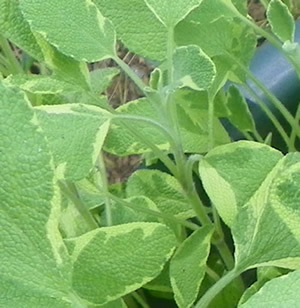The Benefits of Sage
Sage Salvia officinalis

Garden sage - variegated leaf |
|
Medicinal Uses & Health Benefits of Sage
The tradition of using sage in the culinary arts of Thanksgiving began with the early American colonists, but don't let tradition limit your use of this classic herb to turkey stuffing. Sage is an excellent digestive herb when used for seasoning on meals of rich meats and fowl which can be hard on the digestive system. The colonists also considered sage a valuable remedy for colds and fevers in the harsh New England winters. There is something very grounding and relaxing about a hot cup of sage tea with lemon, sipped slowly while the winter holds court outside your warm home. The cold and sniffles you felt coming on melt away in the fragrant steam. Sage has excellent antibacterial and astringent properties, which explains it popular use in gargles for sore throats, gingivitis and sore gums. A strong sage tea or tincture diluted with water can be used.Sage is an excellent natural disinfectant and deodorizer, drying perspiration and helping to eliminate body odor. Extracts of sage are used in personal skin care for its capacity to heal the skin as well.
Sage is a well regarded herb for women and can be especially helpful for relieving the hot flashes of menopause, and slowing heavy menstrual bleeding. Sage is also a good herbal tea for drying up breast milk for weaning. 50 134 Chinese medicine uses red sage, Salvia miltiorrhiza, combined with dan-gui (dong quai), to regulate menstrual flow. , pp122-123
Using sage to darken greying hair comes down to us from the gypsies, and I can personally attest to the fact that it works. What I like about it is the subtle effect, just a gradual darkening that doesn't leave you with ugly gray roots. Sage also leaves the hair feeling soft and shiny, and the scalp invigorated. Sage does not stop at making you look younger, it can also help prevent those "senior moments" as well. Both clinical studies and traditional wisdom agree that sage (Salvia officinalis) or Spanish sage (S. lavandulifolia) has positive effects on memory and concentration in both older people with cognitive problems and younger people with AD. 4

 Three types of sage oil are commonly sold: Dalmatian (Salvia
officinalis), Spanish (Salvia lavandulaefolia) and clary (Salvia
sclarea). Each has a unique fragrance and the oils are not
interchangeable in aromatherapy. Dalmatian sage oil has the characteri ... Learn how to use
Sage essential oil at Annies Aromatherapy
Three types of sage oil are commonly sold: Dalmatian (Salvia
officinalis), Spanish (Salvia lavandulaefolia) and clary (Salvia
sclarea). Each has a unique fragrance and the oils are not
interchangeable in aromatherapy. Dalmatian sage oil has the characteri ... Learn how to use
Sage essential oil at Annies Aromatherapy
The Chinese have long valued sage for its healing properties. Red sage or dan-shen Salvia miltiorrhiza is one of many Chinese species in the genus, and is a very commonly used in traditional Chinese herbal medicine to relieve pain after childbirth and regulate menstruation. Combined with dan-gui, it is used to regulate suppressed menstrual flow.
Comments
Post a Comment